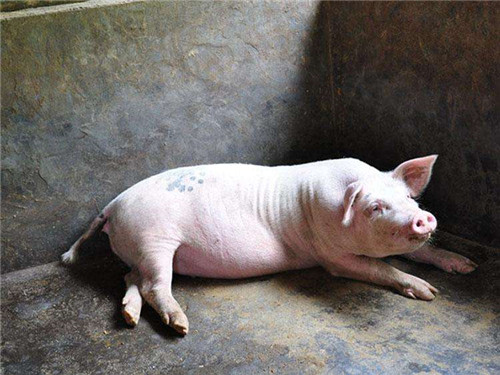Explain the iron supplement allergic reaction of piglets in detail, how to prevent and cure it?
Iron is an essential trace element for the growth and development of pigs. The role of iron in pigs: constitute hemoglobin, participate in the transport and exchange of oxygen and carbon dioxide; improve the immunity of pigs, promote the development of thymus and mesenteric lymph nodes of immune organs, increase the content of antibody IgM and IgG in blood; have physiological activity, participate in metabolism and sterilization; when iron deficiency, the synthesis of DNA in liver will be inhibited due to iron deficiency, and then affect protein synthesis.
1. The cause of iron supplement in newborn piglets.
When piglets are born, the amount of iron stored in their bodies is about 50 mg. The daily iron requirement for normal growth of piglets is at least 7 mg. Breast milk can provide about 1 mg of iron per day, which is not enough to meet the normal growth needs of piglets. With the increase of age, the content of iron in breast milk decreased, while the iron requirement of piglets increased. In order for pigs to grow healthily and rapidly, we should supplement piglets with enough high-quality iron in a timely, rapid and effective manner after birth.
2. Toxicology of iron allergy.
Because iron is a necessary trace element for pigs, and the demand is large, so the toxicity is low. After being absorbed by pigs, iron is distributed in the whole body, mainly in blood, liver and spleen, followed by kidney, heart, skeletal muscle and brain. The content of iron in pig liver is very high. However, the ability of pigs to excrete iron is very limited. The exfoliation of bile and mucosal epithelial cells is the main way of endogenous loss of iron, and little iron is excreted from feces and urine. Therefore, excessive iron supplement can easily lead to iron allergy in piglets. According to the principle of biochemical toxicology, iron is often absorbed in the form of Fe2+ and transported after it is oxidized to Fe3+. When the concentration of Fe3+ in blood exceeds the binding capacity of transport ferritin, Fe3+ precipitates into Fe (OH) 3. Metabolic acid allergy occurs because Fe (OH) 3 releases excessive H + after a large amount of precipitation. The accumulation of Fe3+ complex in the liver can inhibit the activities of glucose-6-phosphatase and succinate dehydrogenase, reduce liver function and cause hepatocyte injury, followed by liver steatosis, hepatocyte necrosis and even portal cirrhosis.

3. Symptoms and pathological changes of iron allergy in piglets.
3.1 symptoms
The main clinical features of acute iron allergy in piglets are diarrhea, vomiting, dullness and dyspnea. Shock occurred within 24-48 hours and blood pressure decreased with convulsion. In acute iron allergy, blood CO2 binding rate decreased, thrombocytopenia, leukocyte count increased, SGPT (glutamic pyruvic transaminase) and SGOT (aspartate transaminase) activity increased, and serum iron concentration increased. The main clinical symptoms of chronic iron allergy are the increase of serum iron and serum ferritin. There are a lot of iron deposits in the liver, spleen, pancreas and skin, and heart failure. The piglets were allergic to iron dextran and died quickly.
3.2 pathological changes
The main pathological change of iron allergy is the deposition of hemosiderin in hepatocytes and macrophages. Wang Baoqin et al. [2] showed that the histopathological changes of liver in patients with chronic iron allergy were typical, which were mainly characterized by mild to moderate focal hepatitis and siderosis granuloma with high iron overload. Siderosis and Perlps staining were strongly positive in almost the whole hepatic lobule, accompanied by obvious inflammatory lesions. There are many iron deposits and often accumulate into clumps or even pieces, mainly concentrated in the hepatocytes from the portal area to the central vein. There are a large number of hemosiderin granules in Kupffer's cells and spleen in hepatic sinusoids and in macrophages and myocardial interstitial cells in alveolar septum of lungs. Hemosiderin granules are widely distributed in hepatic lobules, Kupffer cells, macrophages, bile duct epithelial cells and connective tissue.
4. The cause of iron allergy in piglets.
4.1 Iron dextran has too much molecular weight.
At present, the main ingredient of most intramuscular iron supplements on the market is iron dextran. If the production process of iron dextran is not scientific, it will lead to bruising and swelling at the injection site of piglets after injection of iron supplement. This is a typical symptom of poor absorption of iron supplements in piglets. Generally speaking, the molecular weight of iron dextran for injection is 10000u-12000u, and the excellent iron supplement can reach 5000u-7500u. The smaller the molecular weight, the better the muscle absorption of piglets, the less prone to allergic reactions.
4.2 too many impurities in iron dextran
Iron dextran is a complex formed by the complexation of iron hydroxide and dextran. It is a brown to brown-black crystalline powder, soluble in hot water and a dark brown colloidal solution. At present, ferric chloride, sodium hydroxide, ethanol and other substances are involved in the chemical synthesis of iron dextran, which are very irritating to piglets. If there is too much of these impurities in iron dextran, it will cause allergic reaction in piglets after injection. In addition, excessive high molecular weight dextran, protein and heavy metals can also easily lead to allergies in piglets.
4.3 Iron supplement contains too much iron
If there is a limit to the excretion of iron in the blood, the excess iron is non-binding toxic substance. Wang Xuemei's research believes that when the body continues to ingest too much iron and exceeds the storage of ferritin, iron accumulates in hepatocytes in the form of hemosiderin, causing hepatocyte damage. Excess iron can cause serious damage to the immune system, liver, lungs and kidneys of piglets, resulting in a decline in immune function.
4.4 Piglet deficient in vitamin E
Piglets born to sows with vitamin E deficiency are extremely sensitive to iron-containing drugs. Iron supplementation can aggravate the oxidative stress level and lipid metabolism disorder in pigs, while vitamin E can alleviate the oxidative stress and lipid metabolism disorder induced by iron supplement in pigs. Eighteen hours after acute iron allergy, although most of the iron was absorbed by the reticuloendothelial system, iron was obviously accumulated in the testicular tissue. With the increase of iron content in testicular tissue, the content of lipid peroxidation product TBARS (2-thiobar bituric acid-rective substances) increased, while the content of antioxidant vitamin E decreased. Vitamin E supplementation had no effect on the accumulation of iron in testicular tissue, but could significantly reduce the content of lipid peroxidation product TBARS in testicular tissue.
4.5 genetic factors
Allergic piglets are related to the heredity of sows and breeding boars. The congenital genetic factors of sows can cause the allergic reaction of piglets to iron. With the improvement of pig breeds, the incidence of the disease showed an upward trend. Allergy is mainly caused by two-and three-way hybrid pigs and matching lines of lean meat pigs, accounting for 80% of the affected pigs, and the incidence of local breeds is low.
5. Treatment methods
Pig farms generally use epinephrine (1 mg / branch) for each piglet intramuscular injection, which can be recovered after about 2 hours. Severe piglets can be treated with 10% sodium thiosulfate 400mg/kg, vitamin C100 mg and vitamin B1100 mg intramuscular injection, which is reported to be more effective.
- Prev

Garlic in the prevention and treatment of pig disease wonderful use, the original pig disease with garlic can be cured
Garlic in the prevention and treatment of pig disease wonderful use, the original pig disease with garlic can be cured
- Next

How did sow get anorexia to do? Causes and treatment of anorexia in sows
How did sow get anorexia to do? Causes and treatment of anorexia in sows
Related
- On the eggshell is a badge full of pride. British Poultry Egg Market and Consumer observation
- British study: 72% of Britons are willing to buy native eggs raised by insects
- Guidelines for friendly egg production revised the increase of space in chicken sheds can not be forced to change feathers and lay eggs.
- Risk of delay in customs clearance Australia suspends lobster exports to China
- Pig semen-the Vector of virus Transmission (4)
- Pig semen-the Vector of virus Transmission (3)
- Five common causes of difficult control of classical swine fever in clinic and their countermeasures
- Foot-and-mouth disease is the most effective way to prevent it!
- PED is the number one killer of piglets and has to be guarded against in autumn and winter.
- What is "yellow fat pig"? Have you ever heard the pig collector talk about "yellow fat pig"?

